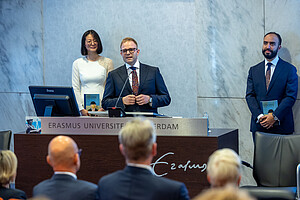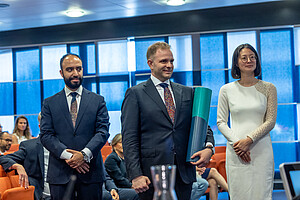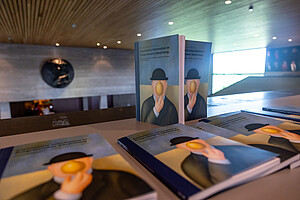PhD Defence Francesco Balocco

In his dissertation, Asymmetric Information in Programmatic Advertising. Three studies on adverse selection, mechanism choices, and fee structures., ERIM's Francesco Balocco delved into the world of programmatic advertising supply chain, where he investigated the role of asymmetric information in the relationships between advertisers (buyers), publishers (sellers), and Ad Exchanges (auction platforms). The advent of programmatic advertising, a high-tech real-time supply chain that facilitates the transaction and delivery of ad impressions, has transformed the face of the display advertising market in recent years. However, its complex competitive and technological landscape poses an issue of a generalized lack of transparency to actors in the supply chain. This research addressed the complexities of asymmetric information, conflicting incentives, and mechanism choices existing within programmatic advertising - opening up new avenues for improving the programmatic advertising supply chain, fostering greater trust, and shaping the future of digital advertising.
Francesco defended his dissertation in the Senate Hall at Erasmus University Rotterdam (EUR) on Friday, 8 September at 13:00. His supervisors were Prof. dr. Ting Li (RSM) and Prof. dr. ir. Eric van Heck (RSM). Other members of the Doctoral Committee were Prof. Gaia Rubera (Bocconi University), Dr. Yashar Ghiassi-Farrokhfal (RSM), Dr. Jason Roos (RSM), and Prof. Dr. Alok Gupta (University of Minnesota), Dr. Yixin Lu (George Washington University), and Prof. Bart van den Hooff (Free University of Amsterdam).
About Francesco Balocco

Francesco Balocco was born in Ivrea (Turin), Italy. He received a BSc in Economics and Management for Arts, Culture, and Communication and a MSc in Management from Bocconi University. After graduating, he joined the Bocconi Center for Research on Marketing and Services (C.E.R.M.E.S.) to work on Natural Language Processing. Here he developed an interest in research at the intersection of Information Systems and Marketing.
In September 2016 he joined the department of Technology and Operations Management at the Rotterdam School of Management, Erasmus University as a PhD candidate under the supervision of Prof. Eric Van Heck and Prof. Ting Li. Since September 2022, Francesco has joined the KIN Center for Digital Innovation at Vrije Universiteit Amsterdam as a tenure-track assistant professor in the Information Systems section. Francesco's research focuses on asymmetric information in real-time advertising supply chains. His work has been presented at leading international academic conferences including the International Conference on Information Systems (ICIS), the INFORMS Annual Meeting, the Conference on Information Systems Technologies (CIST), the Production and Operations Management Society (POMS) conference, the Workshop on Information Systems Economics (WISE), the Italian Marketing Society PhD workshop, the Marketing Science Conference and the Winter American Marketing Association Conference. Francesco has also served as an ad-hoc reviewer for Information Systems Research and a number of conferences such as ICIS, ECIS, AMA Winter and Summer, and INFORMS Data Science.
During his permanence at Rotterdam School of Management, Francesco participated in teaching the Information Strategy course, in the Business Analytics Workshop, and supervised 28 master theses.
Thesis Abstract

The display advertising market has undergone major changes in recent years thanks to programmatic advertising, a high-tech real-time supply chain that facilitates the transaction and delivery of ad impressions. However, actors in the programmatic advertising supply chain still suffer from a generalized lack of transparency due to its complex competitive and technological landscape.
This dissertation investigates the role of asymmetric information in the relationships between advertisers (buyers), publishers (sellers), and Ad Exchanges (auction platforms) in the programmatic supply chain.
The first study examines the coexistence of open real-time auction markets (RTB) and private marketplaces (PMP). We find that allocating ad impressions to PMP through premium contracts not only does not benefit advertisers, but also leads to adverse selection in RTB.
The second study focuses on Ad Exchanges' choice between the second-price and first-price auction mechanisms. Our results suggest that despite widespread mistrust in their commitment to auction rules, Ad Exchanges offering second-price auctions can gain a relevant market share depending on their competitors' fee policies.
The third study examines the impact of publishers' mechanism changes on Ad Exchanges' incentives to set buy-side and sell-side fees. We show that the shift from the waterfall mechanism to header bidding eliminates the incentive for Ad Exchanges to maintain lower sell-side fees, ultimately reducing publishers' revenues.
Overall, these studies provide new insight into the digital advertising market by highlighting the effects of asymmetric information, conflicting incentives, and mechanism choices in programmatic advertising.
View photos of Francesco's PhD Defence
Photos: Chris Gorzeman / Capital Images


